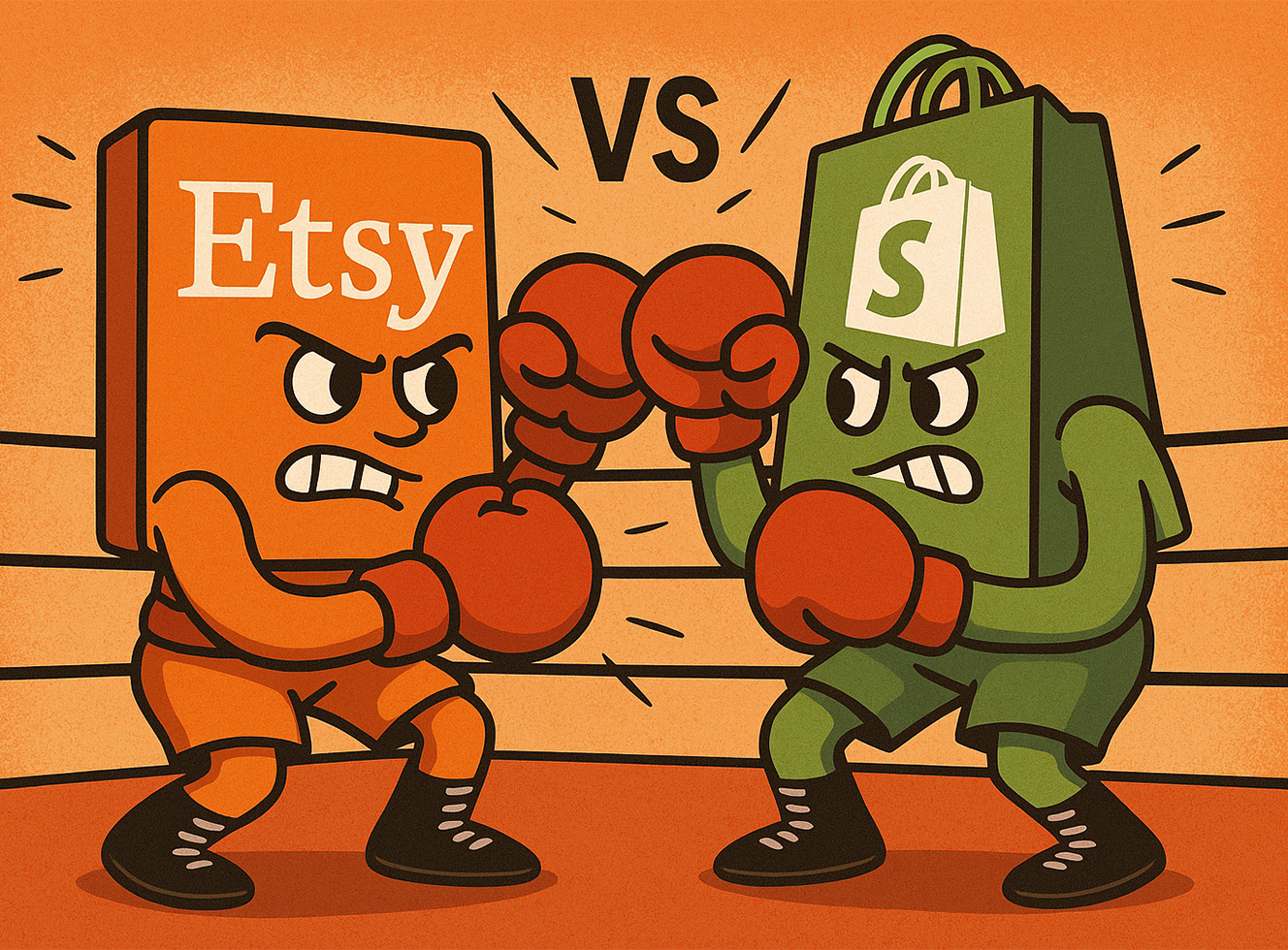
What platform is the best for selling posters?
Overview
If you’re thinking about launching a poster business, two of the most popular platforms to consider are Etsy and Shopify. Both have their pros and cons, and each offers unique advantages depending on your goals, experience, and business style. In this guide, we’ll break down the key similarities and differences between Etsy and Shopify, and help you figure out which one is the best fit for your poster brand.
1. Both Are Great Platforms—Just for Different Reasons
Let’s get one thing out of the way: Etsy and Shopify are both excellent platforms. You’re not making a bad choice by going with either. However, they serve different purposes:
- Etsy is a marketplace, like an online shopping mall where thousands of customers are already browsing.
- Shopify is a website builder, giving you your own custom storefront—but you’re responsible for getting traffic to your store.
In short:
- Etsy brings the traffic to you.
- Shopify requires you to generate your own traffic.
2. Built-In Traffic vs. DIY Marketing
One of the biggest differences—often overlooked by new sellers—is how you get visitors to your products.
Etsy Has Built-In Traffic (And Ads):
- Etsy has over 90 million active buyers.
- Your product is immediately searchable once listed.
- Built-in ad tools like Etsy Ads and Offsite Ads can further boost visibility.
- Etsy’s search algorithm often promotes new listings, especially those with free shipping and good SEO.
Essentially, Etsy does much of the marketing for you—especially when starting out.
Shopify Leaves Marketing Entirely Up to You:
- Shopify is a blank canvas—perfect for custom branding.
- You must drive your own traffic via ads (Facebook, Instagram, Google), SEO, email lists, and influencer marketing.
This approach suits sellers who are ready to invest in marketing or who already have an existing audience.
3. Fees and Pricing
Each platform has different cost structures. Here’s a quick comparison:
Etsy:
- £0.20 listing fee per item
- 6.5% transaction fee
- 3–4% payment processing fee
- Optional: Etsy Ads (pay-per-click)
Shopify:
- Monthly fee starting at £25/month
- 2–3% payment processing fee (depends on plan)
- Optional: marketing/ads you manage yourself
Etsy takes a higher cut per sale, but Shopify has a fixed monthly cost. If you sell in high volumes, Shopify could be more cost-effective over time.
4. Branding and Customization
Branding is crucial for long-term growth. How much customization do you need?
Shopify:
- Full design control (layout, domain, colors, fonts, etc.).
- Lets you build a unique, premium-looking brand.
Etsy:
- Limited customization—mainly shop banner, logo, and name.
- All Etsy shops share a similar layout and structure.
If you want a professional, distinct online store, Shopify is ideal. If you’re new and just want to list products fast, Etsy is simpler to set up.
5. Audience Behavior & Buying Intent
Etsy Shoppers:
- Often have a specific purchase in mind (e.g., “vintage travel poster”).
- Trust Etsy’s review system and buyer protection.
- Prefer quick, hassle-free transactions.
Shopify Shoppers:
- Typically discover you through marketing efforts.
- Need to trust your brand before buying.
- Can become repeat customers if your store experience is good.
6. Ideal Use Case for Each Platform
Choose Etsy if you:
- Are just starting out and want to test your designs quickly.
- Don’t want to spend money on ads initially.
- Want exposure to millions of buyers already browsing Etsy.
- Sell unique or niche items—Etsy shoppers love originality.
Choose Shopify if you:
- Already have an audience or an email list.
- Want full customization and control over branding.
- Are prepared to invest in marketing or ads.
- Plan to grow into a large-scale eCommerce brand.
7. Why Not Both?
Many successful businesses start on Etsy, validate their products, then launch on Shopify once they have traction.
Using Etsy to:
- Get initial sales and reviews
- Test and refine product offerings
Then Shopify to:
- Build a fully branded store
- Gain independence from Etsy’s rules and fees
- Scale your marketing and operations
8. Selling AI Art: Considerations for Etsy vs. Shopify
AI-generated artwork is on the rise. Both platforms allow it, but keep these points in mind:
Etsy and AI:
- No outright ban on AI art, but you must comply with copyright laws.
- Disclose if it’s heavily AI-generated, to build trust and avoid misunderstandings.
- Etsy could introduce specific AI policies in the future as AI content grows.
Shopify and AI:
- No strict AI-related rules—your storefront is fully under your control.
- You can choose how to brand or label AI-generated designs.
- Great for building an AI-focused brand.
Key Tip: Always ensure your AI art isn’t infringing on copyrighted material or celebrity likenesses. Check the commercial licensing terms of any AI tool you use.
Final Thoughts: Etsy vs. Shopify
Ultimately, both platforms can help you build a thriving poster business. Here’s the bottom line:
- Go with Etsy if you want instant traffic and simpler setup.
- Go with Shopify if you want full control, a custom brand, and are ready to market.
- Use both to diversify and enjoy the best of each.
With the right strategy, consistent effort, and a quality print partner like PrintShrimp, you can succeed on either platform—or both!


